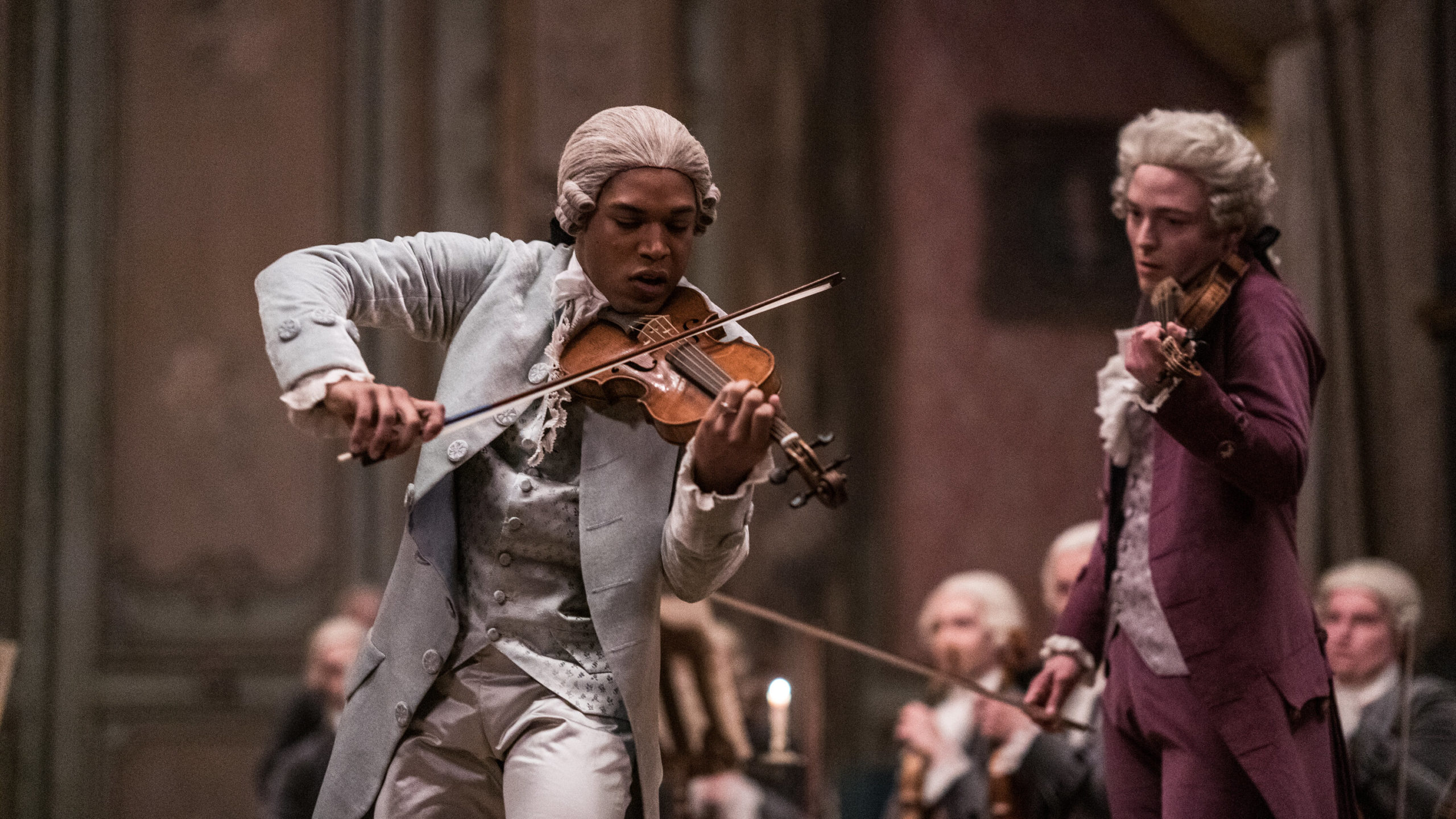
Film Reviews: Chevalier
Film Reviews
Chevalier
Director: Steven Williams
Element Pictures and TSG Entertainment
In Theaters: 04.21
The phrase “a true story” must always be taken with a grain of salt, particularly when dealing with a lesser-known historical figure. Chevalier chronicles the life and achievements of Joseph Bologne, the first Black composer of European classical music in recorded history, and it takes plenty of dramatic liberties. It also demonstrates that his status as “lesser known” is both tragic and outrageous and that there is nothing lesser about his importance in history.
Joseph Bolonge, portrayed by Kelvin Harrison, Jr (Cyrano), was the illegitimate son of an African slave and a French plantation owner. Joseph has risen through 18th century–Parisian society thanks to his prodigious accomplishments as a virtuoso violinist and composer, as well as his renowned fencing prowess. Queen Marie Antoinette (Lucy Boynton) bestows the title of Chevalier de Saint-Georges upon Joseph, and his next goal is to take over as director of the Royal Academy of Music at the Paris Opéra.
To that end, Marie Antoinette sanctions a contest: Joseph and his chief rival, Christoph Gluck (Henry Lloyd-Hughes, Killing Eve), will each compose an original opera, and the best composer will win the post. Joseph vigorously pursues the position and his opera’s leading lady, Marie-Josephine (Samara Weaving, Ready or Not), wife of the powerful and ruthless Marquis de Montalembert (Marton Csokas, The Equalizer). While their love affair seems like something out of a dream, the reality of the prison of their stations turns it all into a nightmare. For all of his talents and accomplishments, Joseph’s skin color will always determine his place in an unjust world, and bigger things than a love affair are destroyed by this devastating truth.
Prolific television director Steven Williams (Lost, Westworld, Watchmen) brings precision, polish and panache to this passionate period piece, and it’s an absorbing if slight romantic melodrama with costumes and production design that are a veritable visual feast. The film shifts into high gear in the second act as Joseph begins to embrace his destiny as a force for change and stops running from his heritage. While the relationship between Joseph and Marie-Josephine is engrossing and tragic, the most complicated and interesting relationship in Joseph’s life, and in the film, is with the woman who gave birth to him. When Joseph’s father dies, he leaves Joseph no inheritance, but he grants freedom to Nanon (Ronke Adekoluejo), the mother that Joseph hasn’t seen since childhood. Joseph finds his feelings toward her are complicated by resentment over the separation and the knowledge that if he had stayed with her on the plantation, he would not have become the man of stature that he is now. While this aspect of the story is greatly fictionalized—as is the affair with Marie-Josephine—there’s an emotional resonance to the exploration of Joseph’s duality and demons that arguably justifies it as a great piece of timely storytelling.
Harrison is superb in the title role, portraying a complex figure who is at times more sympathetic than likable, though as he grows beyond his own involved agenda and puts his voice toward the greater good, he becomes easy to root for. The chemistry between Harrison and Weaving is thrilling, and Adekoluejo provides us with moments that range from emotionally shattering to gloriously uplifting. The entire ensemble is impeccable, with Boynton giving a compelling supporting performance as the enigmatic Queen, and Minnie Driver and Sian Clifford standing out as La Guimard and Madame De Genlis, respectively, one a thorn in Joseph’s side and the other one of his greatest supporters.
Still, it’s Harrison’s showcase, and his commitment to learning his character’s instruments pays off as the performances look utterly believable and enhance the sublime musical sequences. These are integral to the experience of Chevalier, and include iconic classical pieces—a delightful violin duet turned duel between Joseph and Wolfgang Amadeus Mozart (Joseph Prowen) is a highlight—as well as new material from composers Kris Bowers and Michael Abels. Most importantly. Chevalier is packed with as many of Joseph Bologne’s still magnificent surviving works as the filmmakers can get their hands on. These compositions are sadly limited in number due to all of his music being outlawed when Napoleon Bonaparte reinstated slavery in France, and far too much of it was lost forever. If this doesn’t give you enough of a sense of outrage, consider that a sequence wherein a letter from renowned figures in the musical world petitioning the Queen not to consider Joseph for the Opera House position because he is member of a “subhuman race” is taken verbatim from the actual missive.
Chevalier is not a definitive telling of Joseph Bologne’s story, though it’s not only an entertaining and moving one, it’s the only one in popular culture. Hopefully, that will change, or at the very least, this haunting film will inspire people to research the man and his many accomplishments and encourage Hollywood to bring more untold stories to the screen. –Patrick Gibbs
Read more reviews on the latest dramas:
Film Review: Beau is Afraid
Film Review: To Catch a Killer